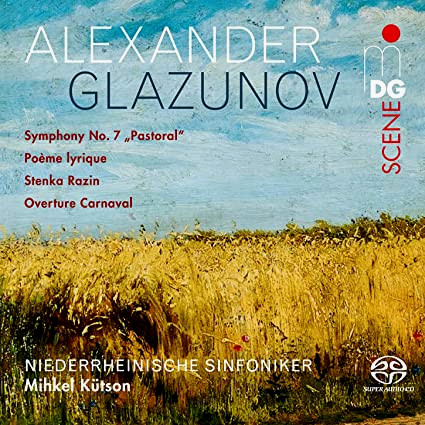

Symphony No. 7 in F major, Op. 77 Stenka Razin, Op. 13 Poème lyrique, Op. 12 Overture Carnaval, Op. 45
There's no rhyme or reason that I can think of that would explain why some composers are constantly in the public eye, and always centre stage either in the concert halls or on new recordings, whereas other composers just as prolific or noteworthy are always left waiting in the wings and/or under-represented on radio, stage or in recordings. A case in point is Russian composer, conductor and teacher Alexander Glazunov (1865-1936). Ask anyone, even those steeped in music, to name a famous work by Glazunov and most if not all, can only come up with The Seasons. Is it because despite the fact that one of his Conservatory students was Dmitri Shostakovich, and that he lived during one of the most fertile periods in musical history when music was evolving at a rapid pace and branching out in multiple directions, but he chose to continue writing scores more in line with the previous generation of composers? Why should that matter when you consider that the "autumn" segment of The Seasons is one of music's most beautifully lyrical moments.
In typical "Pastoral" form, the Symphony No. 7 opens with the awakening of life at dawn, and the whole first movement is filled with bright orchestration touches and joyful tunes embracing the promise of a new day. The darker Andante movement that follows creates the perfect contrast of mood and temperament. The brass processional opening sets the tone of sombre remembrance for lives past, and a time for quiet reflection. In typical Scherzo fashion, the ensuing Allegro giocoso bustles with forward rhythmic momentum and Glazunov's flair for light yet effective orchestral brush strokes. The symphony closes with a brilliant clash of colors, combining the joyous feel of the opening with the solemn spirit of the slow movement's ceremonial gravitas.
Although Alexander Glazunov composed eight symphonies (No. 9 was left unfinished), seven string quartets, some choral and solo instrumental works, it seems that the brunt of his output was focused on incidental orchestral pieces. Ones who have heard The Seasons or his highly evocative tone poem The Sea will attest that he was at his best writing descriptive, short form orchestral works. His early Poème lyrique for example, with its gently swaying character, evokes melancholy yearning for relief, and its effulgent orchestration touches bring it there. On the other hand the high spirits and festive atmosphere of a public fair or carnival are well on display in his Overture Carnaval, and brings a boisterous finish to this fine recording.
New to the recording scene, the Niederrheinische Sinfoniker stems from the union of two municipal orchestras during the 1950s, and was formally established in 1973. They act as both a concert orchestra and a theatre orchestra. Their only other availble CD is from a live 2017 recording of Gustav Mahler's Symphony No. 4. Befittingly so in 1902, one of its original municipal orchestras, the Krefeld Municipal Orchestra had the honor of performing the premiere of Gustav Mahler's Symphony No. 3 under Mahler's own direction (Booklet notes).
Jean-Yves Duperron - February 2022